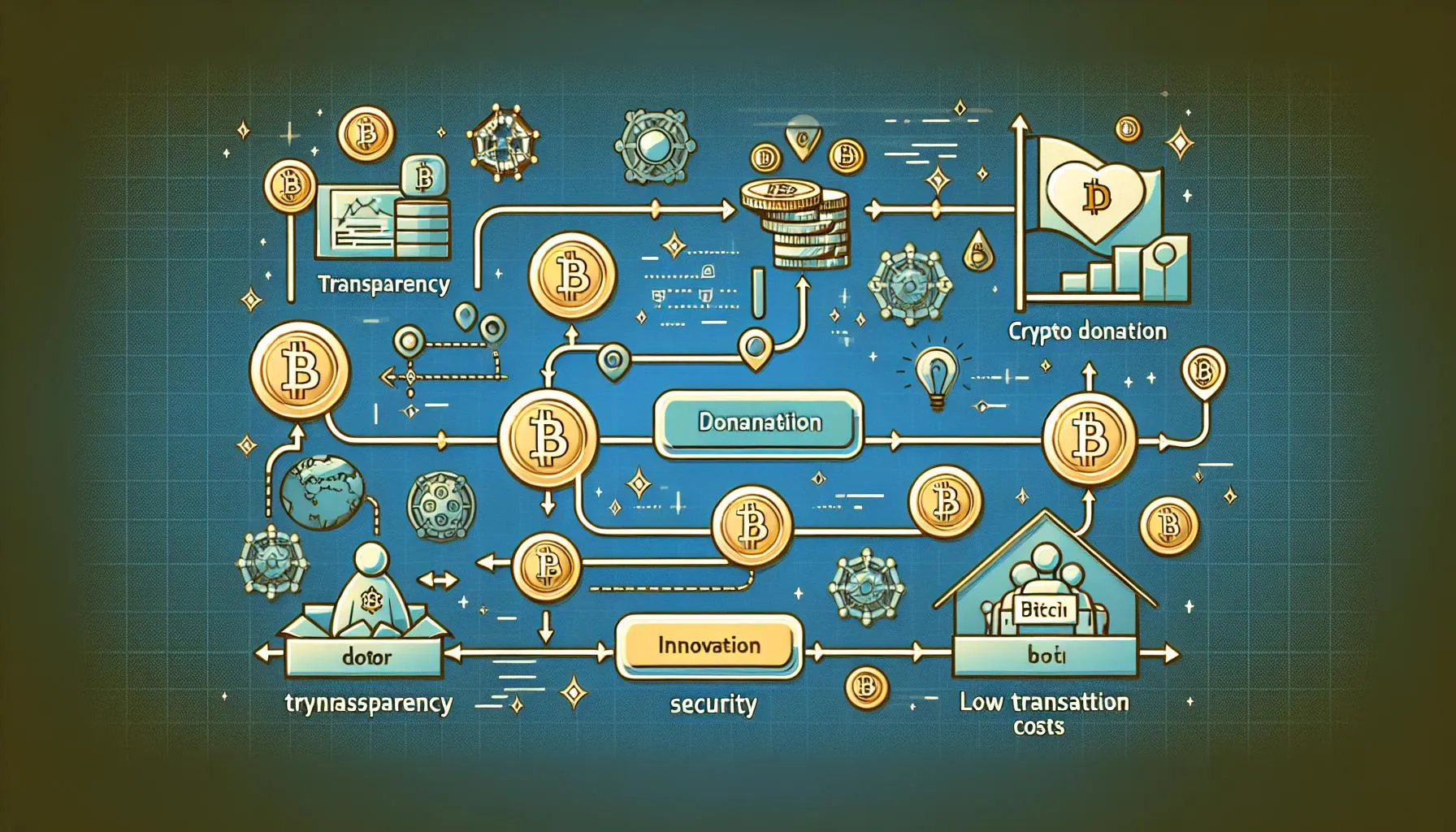
Ever thought about how cryptocurrencies are revolutionizing the way we give? Imagine donating to your favorite charity with just a few taps on your phone, without worrying about hefty transaction fees or delays. It’s not science fiction—it’s happening now.
Crypto donations are becoming a game-changer in philanthropy. They offer a fast, transparent, and cost-effective alternative to traditional methods. Plus, they open up new possibilities for global giving that were previously unimaginable. Crypto fundamentals at its core.
If you’re passionate about making an impact but frustrated by the inefficiencies of conventional donation systems, crypto donations might be your answer. You won’t have to deal with slow bank transfers or high administrative costs anymore.
What Are Crypto Donations?
Crypto donations are gifts made using cryptocurrencies like Bitcoin or Ethereum. Imagine sending money to your favorite charity without dealing with banks, credit card fees, or even borders. It’s as simple as sending an email but with a digital twist.
I remember the first time I donated crypto. It felt like a secret handshake among tech-savvy philanthropists. One minute I’m checking my wallet’s balance; the next, I’m clicking “send” and wondering if I’ve just funded a new playground or someone’s coffee fund in another country!
What’s cool about crypto donations? First off, they’re fast. We’re talking minutes instead of days. No more waiting for bank transfers to clear while you wonder if your donation will ever reach its destination.
Transparency is another biggie. Every transaction is recorded on the blockchain—a kind of public ledger that everyone can see but no one can alter. So you know your donation isn’t disappearing into some black hole of bureaucracy.
Lower transaction costs also make crypto donations appealing. Traditional methods often involve hefty fees (looking at you, wire transfers). With crypto, those fees shrink significantly—more of your money goes directly where it’s needed.
Ever tried donating internationally?
Banks love throwing wrenches into those plans with their exchange rates and hidden fees. Cryptocurrencies laugh in the face of borders—your Bitcoin doesn’t care if it’s moving from New York to Nairobi.
But here’s something to chew on: how might this evolve? Will we see charities exclusively accepting crypto in the future? Or could there be tax incentives for donors who choose digital currencies over fiat?
Benefits of Crypto Donations

Alright, let’s jump into the cool perks of donating with crypto. You know how regular donations can be such a drag with all the fees and delays? Crypto donations totally flip that script.
Transparency and Security
Crypto donations shine in transparency and security. With blockchain tech (think of it as a super-secure digital ledger), every transaction is recorded for everyone to see but nobody can tamper with it. Imagine writing your donation on an indestructible whiteboard—everyone can check it out, but no one can change what’s written. This means you always know where your donation goes, reducing fraud and increasing trust.
Lower Transaction Fees
Ever sent money only to realize half of it went to bank fees? It’s infuriating! Crypto cuts out these middlemen, so more of your money reaches the cause. I once donated $100 in Bitcoin to a charity, and guess what? Only about 50 cents went to transaction fees. Compare that to traditional methods where you might lose $5 or even $10! So yeah, more bang for your buck—or should I say Satoshi?
Popular Cryptocurrencies for Donations
Crypto donations are catching on, and a few cryptocurrencies stand out as favorites. Here’s a quick rundown of the most popular ones.
Bitcoin
Bitcoin’s like the granddaddy of all cryptos. It’s what most people think of first when they hear “cryptocurrency.” I remember my first Bitcoin donation—it was to a wildlife charity. It felt pretty cool sending money without dealing with banks or credit cards. And trust me, that transaction fee was peanuts compared to what I’d have paid otherwise! Plus, Bitcoin’s widespread acceptance makes it super easy for charities to receive funds quickly and securely.
Ethereum
Ethereum is another big player in the crypto world. What’s neat about Ethereum is its smart contracts—basically fancy automated agreements that don’t need middlemen. My buddy set up an Ethereum donation for his local food bank, and it was slick how everything just worked seamlessly. If Bitcoin’s the king, Ethereum’s like the tech-savvy prince making waves with new ideas and innovations.
Other Altcoins
Then there are altcoins, which are like the indie bands of crypto—they’re not mainstream but have loyal fans. Coins like Litecoin, Ripple (XRP), and Stellar can also be used for donations. I once donated some Litecoin to an environmental cause; it was fast and cost-efficient! Each altcoin has its quirks, but they all aim to make donating easier and cheaper than traditional methods.
How to Accept Crypto Donations
Have you asked yourself how charities can start accepting crypto donations? It’s not as complicated as it sounds. Grab your coffee, and let’s immerse.
Setting Up a Crypto Wallet
First things first, you need a crypto wallet. Think of it like setting up an online bank account but with fewer forms and no hold music. I remember when I set up my first wallet—felt like stepping into the future!
You have two main types: hot wallets and cold wallets. Hot wallets are online (super convenient), while cold wallets are offline (like a USB drive). For example, Coinbase offers an easy-to-use hot wallet. If you’re paranoid about security, Ledger’s hardware wallets might be more your style.
Integrating with Donation Platforms
Next up is integrating your wallet with donation platforms. This step makes accepting crypto super smooth for both you and the donors. Imagine it’s like adding PayPal to your website but way cooler.
Platforms like BitPay or The Giving Block specialize in facilitating crypto donations for nonprofits. They handle all the nitty-gritty details so you don’t have to stress about fluctuating prices or complicated tech stuff. When I tried out The Giving Block, I was amazed at how seamlessly everything worked—no headaches!
So there you have it: setting up a wallet and integrating it with donation platforms isn’t rocket science. Who knew giving back could be this futuristic yet straightforward?
Legal and Tax Considerations
Exploring the legal and tax world of crypto donations can feel like trying to find your way out of a maze. But don’t worry, I’ve got you covered.
Regulatory Compliance
When donating cryptocurrency, it’s crucial to comply with regulations. Think of it as making sure you’re not speeding in a school zone—important but sometimes confusing. Different countries have unique rules about how crypto donations are treated, so what works in the US might not fly elsewhere. In the US, for example, regulatory bodies like the IRS (Internal Revenue Service) and FinCEN (Financial Crimes Enforcement Network) set stringent guidelines.
Charities need to register their wallets and report transactions just like they would with traditional money. This ensures everything’s above board and no one ends up on an episode of “Crypto Cops.” And for us donors? We must keep our transactions transparent and well-documented—no shady back-alley Bitcoin exchanges allowed!
Tax Deductibility
Now let’s talk taxes because who doesn’t love chatting about those over coffee? Crypto donations can be tax-deductible, which is fantastic news if you’re looking to save some bucks come tax season. Here’s the kicker: you need to donate directly to a registered charity that accepts cryptocurrencies.
When you donate crypto, it’s treated like donating stocks or other property. If you’ve held your crypto for more than a year before donating it, you could be eligible to deduct its fair market value on your taxes. Imagine telling your friends at dinner that your 2015 Bitcoin purchase funded scholarships! Just remember to get a receipt from the charity—they’re essential when claiming deductions.
Crypto taxation might seem complicated but think of it as learning a new dance move—it’s tricky at first but totally doable with practice and maybe some guidance from an accountant who’s cool with blockchain tech.
Real-World Examples of Crypto Donations
Crypto donations aren’t just a theoretical concept; they’re making waves in the real world. Let me share some cool stories where crypto played hero.
Pineapple Fund
Ever heard of the Pineapple Fund? It’s this mysterious donor who decided to give away their Bitcoin fortune to charities. They ended up donating $55 million worth of Bitcoin to different causes, from clean water projects to mental health organizations. Imagine waking up one day and deciding, “Hey, I’ve got all this digital cash, let’s make the world better!” It’s like a modern Robin Hood but with less archery and more blockchain.
GiveDirectly
Another amazing example is GiveDirectly, an organization that provides direct cash transfers to people living in poverty. They’ve started accepting crypto donations because it lets them get funds into people’s hands faster and with fewer fees. Traditional banks can take days or even weeks to process international transactions, but with crypto, it’s often done in minutes. Picture someone getting life-changing money almost instantly because you sent some Ethereum their way—feels good, right?
Save the Children
Save the Children jumped on the crypto bandwagon too. They were one of the first major nonprofits to accept Bitcoin back in 2013 after Typhoon Haiyan hit Southeast Asia. Since then, they’ve received various cryptocurrencies for disaster relief efforts worldwide. It’s kind of wild when you think about how far we’ve come—from rattling coins in a tin can on street corners to sending digital assets across continents for urgent aid.
Red Cross
The Red Cross also gets its slice of the crypto pie now and then. In 2021 alone, they raised over $2 million through cryptocurrency donations during emergencies like wildfires and floods. These quick donations mean they can respond faster and save more lives without waiting for traditional funding channels.
Personal Experience
I made my own small contribution by donating Litecoin to a local animal shelter last year. I remember thinking it felt surreal—no checks or credit cards involved—just a few clicks on my phone app! Plus seeing my donation verified on a public ledger was strangely satisfying (and reassuring). The shelter used those funds almost immediately for vet bills and food supplies.
Key Takeaways
- Revolutionizing Philanthropy: Crypto donations offer a fast, transparent, and cost-effective way to donate, eliminating traditional banking fees and delays.
- Transparency and Security: Blockchain technology ensures every transaction is recorded publicly but securely, reducing fraud and increasing trust in the donation process.
- Lower Transaction Fees: Unlike traditional donation methods that come with hefty fees, crypto donations minimize costs, allowing more funds to reach the intended cause.
- Popular Cryptocurrencies for Donations: Bitcoin and Ethereum are leading choices for crypto donations due to their widespread acceptance and advanced features like smart contracts.
- Simple Setup for Charities: Setting up a crypto wallet and integrating it with donation platforms like BitPay or The Giving Block makes accepting crypto straightforward for nonprofits.
- Legal and Tax Benefits: Compliance with regulations is crucial; however, donors can benefit from tax deductions when donating appreciated cryptocurrencies directly to registered charities.
Conclusion
Crypto donations are revolutionizing how we give, making the process faster and more transparent. My experience with crypto giving has shown me just how efficient it can be, from low transaction costs to the security of blockchain technology.
As more charities begin to accept cryptocurrencies, I believe we’ll see even greater adoption and innovation in this space. If you’re curious about donating crypto or a charity looking to accept it, now’s a great time to explore this exciting frontier.
Let’s embrace the future of charitable giving together.
